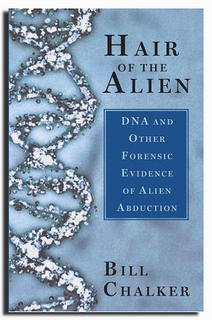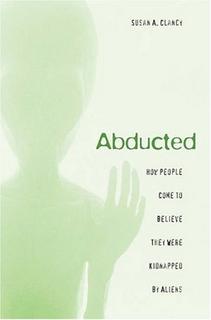Clancy, of "The Overflow" - Harvard exorcising it's UFO demons?


Hearing that Susan Clancy of Harvard has a book - "Abducted: How People Come to believe they were kidnapped by Aliens" - coming out from Harvard University Press due on October 1st, I immediately had floating into my mind "in my wild erratic fancy, visions come to me of Clancy".
With sincere apologises to our wonderful iconic Australian "bush poet" "Banjo" Paterson for my abduction of fragments from his 1889 poem "Clancy of the Overflow", but they seem wonderfully insightful in a skewed kind of way:
"for want of better knowledge"
"And an answer came directed in a writing unexpected"
"I can hear the fiendish rattle"
"And the language uninviting"
"Comes fitfully and faintly"
"And the hurrying people daunt me, and their pallid faces haunt me
As they shoulder one another in their rush and nervous haste,
With their eager eyes and greedy, and their stunted forms and weedy,
For townsfolk have no time to grow; they have no time to waste."
I look forward to reading Susan Clancy's offering, and I hope it is more substantial than work that seems to be driving it.
In "Hair of the Alien" (pages 20-21) I wrote:
"During 2002 and 2003 research conducted at Harvard University reignited the idea of psychological mechanisms as a possible explanation of alien abduction reports. The key players in the debate were psychologists Susan Clancy and Richard McNally. "False memory creation was examined in people who reported having recovered memories of traumatic events that are unlikely to have occurred: abduction by space aliens," states the abstract of their paper, which was published in the Journal of Abnormal Psychology. The researchers examined false recall and false recognition in three groups: "people reporting recovered memories of alien abduction, people who believe they were abducted by aliens but have no memories, and people who deny having been abducted by aliens." They concluded: "Those reporting recovered and repressed memories of alien abduction were more prone than control participants to exhibit false recall and recognition. The groups did not differ in correct recall or recognition. Hypnotic suggestibility, depressive symptoms, and schizotypic features were significant predictors of false recall and false recognition."I concluded:
This research is interesting but has some severe limitations. The sample sizes used in each group were very small - 11, 9, and 13 respectively. Even more critically, the profile of the "recovered memory" group is flawed. The paper states, "None of the participants interviewed reported continuous memories of alien abduction (i.e., memories of alien abduction that were never forgotten) .... Memories were recovered both in therapy with the help of certain therapeutic techniques (e.g., hypnosis) and spontaneously, after reading books, watching movies, or seeing television shows depicting such episodes." In fact, there are a significant number of people reporting abductions who do not rely on hypnosis and other therapeutic techniques. Their memories are based on clearly recollected incidents for which they have no memory loss or delayed recalled."
"we must exercise caution against either the simplistic acceptance of alien causation or skeptical dismissal. Such uncertainties make it all the more important to concentrate on a broad forensic approach to abduction experiences, but physical evidence, whereever possible, needs to be at the heart of these investigations." - "Hair of the Alien" (page 21)The Peter Khoury alien abduction milieu, which is presented as a detailed case study in my book "HAIR of the ALIEN", represents a potent example of what the Clancy/McNally research fails to address - abduction cases that are clearly and consciously recollected, with compelling physical evidence that appears to support their legitimacy.
Susan Clancy's forthcoming book on initial impressions seems to represent an "overflow" of flawed and limited research, albeit interesting, and perhaps spawned from Harvard's attempts to exorcise the UFO and alien demons, unleashed by the late John Mack (another Harvard icon) in his research into alien abductions. Harvard sought to censure John Mack, but instead seem to invoke misguided and failed attempts at martyrdom. Richard McNally sought to anchor a "mainstream" psychological response with his "bedrock" book "Remembering Trauma". Perhaps Susan Clancy is channelling "overflow", or maybe her book will be more substantial than "language uninviting (that) ... comes fitfully and faintly," and more robust than mere "foetid (hot) air" from some imagined "vision splendid."
There are suggestions that Susan Clancy's book hints "at a larger ambition, to explain the psychology of transformative experiences, whether supposed abductions, conversions or divine visitations." (Benedict Carey, New York Times, August 9, 2005) She will be walking in a rather large shadow if she embarks into that territory.
John Mack was a potent and articulate spokesman for some of the wider dimensions of human experience. With his 1994 book "Abduction - Human Encounters with Aliens", and more particularly his 1999 book "Passport to the Cosmos - Human Transformation and Alien Encounters", he signalled and mapped out his perspectives. In essence "Passport" represented a shamanic envisioning of the whole alien abduction mystery. The transformative aspects of the phenomenon held sway for John Mack, and examination of the physical dimensions seemed secondary or even unimportant. The kind of information I have focused on such as DNA, albeit not without ignoring the shamanic aspects, perhaps conflicted with the numinous dimensions of the hyper reality John Mack speculated may be at the heart of the abduction phenomenon. It seems that in alien abductions John Mack saw affirmations of important concerns and perspectives he had held for some time, and they sat well with the transpersonal and environmental issues he championed for some time, certainly long before the alien sirens beckoned him into their seductive embrace.
To do that requires one to disconnect from the classic physical dimensions of the abduction phenomenon, all of which seem to argue that at least part of the experience occurs in the real world and real world consequences occur. Physical evidence, both explicit and hidden, is becoming available. What has not been so much in evidence are appropriate methodologies to capture and assess this range of evidence. So far the record has been uninspiring, but a new paradigm is emerging, one that has been well represented in terms of potential and actual results by one small part of that paradigm, namely DNA. Other parts of that new paradigm have their anchor in science and its broad base of approaches to understanding the world around us, even when it is being intruded upon, perhaps by something out there. Thats the primary focus of my offering - "Hair of the Alien" - a journey through a scientific DNA forensic paradigm.


0 Comments:
Post a Comment
<< Home